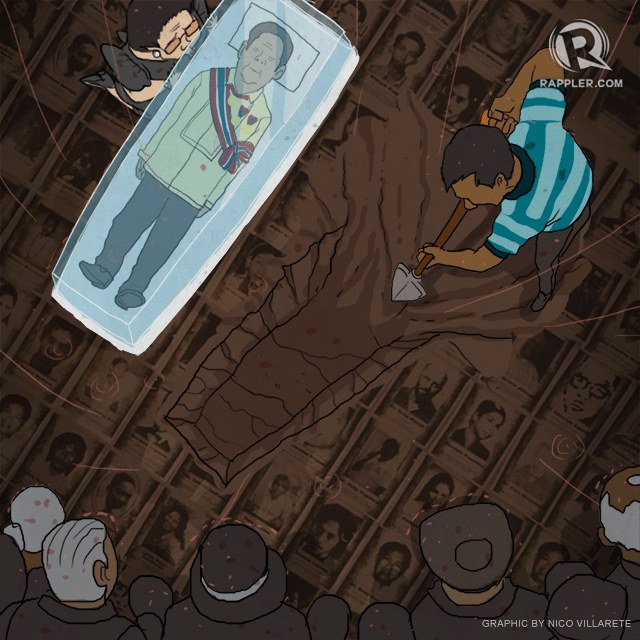Incoming President Rodrigo Duterte likes to project himself as a quick-fix man. When he sees a problem, he tends to throw a solution with little regard for the consequences to values and principles.
His decision to have the remains of former President Ferdinand Marcos buried in Libingan ng mga Bayani (Heroes’ Cemetery) is one of them. What led him to make this a priority and how he decided on it are unclear.
It was in Laoag City, during a campaign sortie, when he first made the promise. Why? “Because he [Marcos] was a great president and he was a hero…” Duterte said. He could not have missed the political points he was bound to earn from that declaration. After all, vice presidential bet Senator Ferdinand Marcos Jr, with the Solid North behind him, had courted Duterte for months to persuade him to be his standard-bearer. This inspired the creation of a group of Ilocanos supporting a Duterte-Marcos tandem called "AlDub," or Alyansang Duterte-Bongbong." It's also a fact that Duterte's many constituents in Davao are Ilocanos themselves who had migrated from the North.
Following his controversial "Marcos-was-a-great president" statement, Duterte changed gears and said he was allowing Marcos’s corpse to be buried in the Heroes’ Cemetery not because he was a hero but because he was a Filipino soldier. The next president considers this a step in “healing” the country.
But to those who oppose this move, nothing less than justice can heal the wounds of the past. Marcos, after all, cloaked the country under martial rule for more than a decade, crowded the prisons with political detainees, with thousands tortured and killed.
Marcos also plundered the public coffers, siphoning off more than a billion dollars to Swiss banks. In the 1990s, the Swiss government turned over to the Philippines part of it, $627 million worth of Marcos deposits.
Not only that. His record as a soldier is questionable, as historical documents have shown. The New York Times reported in 1986 that Marcos’ claims that he led a guerilla resistance unit during the Japanese occupation of the Philippines were “fraudulent.”
Who can be buried at the 103-hectare Heroes' Cemetery? Even the Armed Forces of the Philippines, which owns the property, has specific guidelines on this. It states that those who have been dishonorably discharged from service, or personnel convicted of an offense involving moral turpitude, do not qualify for interment at the cemetery.
Does the nation need further proof that Marcos was "dishonorably discharged" in a people power revolution 30 years ago? Do we have to go through every testimony, count every stolen money, and name every human rights victim to remind the incoming president that Marcos is no hero?

Burying a body, for Duterte, is burying our history. That, to him, is what constitutes “healing.”
Look what’s happening in Spain. It has been 41 years since the late dictator Francisco Franco was buried in the Valley of the Fallen, a memorial to those who died fighting in the Spanish Civil War. Yet an advocacy group is demanding the exhumation of his remains because, they say, Spanish taxpayers should not be paying for its upkeep.
“…the State is subjecting the dictatorship’s victims to a form of mistreatment and humiliation by obligating them to pay through their taxes for dictator Francisco Franco’s tomb,” the group, The Association for the Recovery of Historical Memory, wrote.
By choosing to bury the late dictator in the Heroes’ Cemetery, Duterte is telling us and the next generations to forget part of our history, a blow to our already weakening collective memory. – Rappler.com